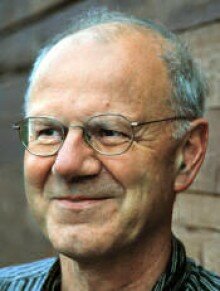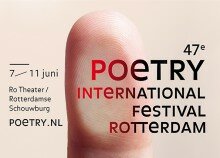Nederlands ►

Toon Tellegen, born in Den Briel, is considered one of The Netherlands’ finest poets, and his work has been awarded many literary prizes. He has published more than 20 collections to date. In 2015, his volume De Werkelijkheid (The reality) was nominated for the VSB Poetry Prize for best Dutch-language collection.
While he considers himself in the first place a poet, he is also a well-known children’s book writer, whose animal stories delight children and adults alike. In addition he has also written novels for adults and several plays.
Tellegen’s poems have been translated and published in the Czech Republic, Finland, Germany, Ireland, Portugal, Russia and Slovenia. Four books of poems have appeared in English so far, including Raptors (Carcanet, 2011; Popescu Prize for European Poetry in Translation) and A man and an angel (Shoestring, 2013).
‘Someone told me I was a room’. This is how one of Toon Tellegen’s poems begins. It is a typical beginning for him: nothing is explained, we have to assume that this is now the reality within which the poem will unfold. And indeed, the person in question seizes the opportunity to look at himself as a room: ‘A room! I thought. Perhaps even a drawing room!’ He elaborates on this insight and concludes: ‘but when I pursued this thought, there were walls missing in me, and doors and slanting rays of light’.
Tellegen experiments with human identity, and the poem is the ideal place for reflecting on the subject. This could easily be heavy-handed, except that his poetry stands out for its light-hearted, lucid tone and its unphilosophical, indeed extremely evocative, narrative style. Most of the poems are miniature stories, written in free verse that resembles prose but for its line distribution.
Anything is possible in the world of these poems. Around a street corner, for instance, lives a cannibal, who is so incredibly hungry that he eats people by the dozen. ‘Hear how he eats, how he cries out for new people!’ This is a grave situation for all those thousands of people hiding in the reeds, just around the corner. One can only deduce that man is as fragile as a reed.
The biggest surprise in this work is that Tellegen takes everything literally, thus creating a wealth of meanings. Take for instance this very immediate and intriguing opening: ‘A man falls prey to doubt from time to time, decides to split in half, and moves in two directions’. After having been split in two for a while, he goes looking for himself again, carefully sneaking up on himself from two different angles. The poem renders a state of mind in the form of a story. Tellegen is a master at projecting emotional states such as fear, helplessness, alienation, surrender, delight in narrative poetry. Strikingly often, he is concerned with disappearance, grief, death. He lets an apple rot slowly, he kills a mosquito, conscious of guilt, he discovers a bull in the china shop of his soul, he watches himself climb a wall on the edge of his thoughts.
Each of these poems – and there are many – is a stunningly sharp and telling parable about human feelings and behaviour. They are never realistic, always grotesque, exaggerated, surreal, absurd (here Tellegen owes a debt to Daniil Charms), and always busy with language. His verse inevitably draws the reader into the poem: ‘Life is a side branch of love’, ‘A man discovered that love does not exist’, ‘Shall I give you a lethal kiss?’
Tellegen's poetic universe is a densely populated one and literally covers every aspect of our inner and outer worlds. His poetry is simply unparalleled.
On Toon Tellegen’s poetry:
‘Tellegen’s poems are parables for grown-up children. Their world is stripped-down, urgent, playful, quirky, familiar as children’s games yet strangely disorienting. They induce a mini-millennial fever, the disquieting excitement of being about to pass through the needle’s eye’.
‘I first saw the work of this extraordinary poet in The Manhattan Review, and frankly, I was amazed. The lack of an American volume is a literary deprivation of the first order’.
– John Brehm, US poet, author of Sea of Faith
‘Tellegen’s poetry is full of cheerful human misunderstanding. With their fairytale speed, his poems encompass entire novels’.
– Herman de Coninck, Flemish poet, in Intimacy Under the Milkyway
Bibliography
Poetry
De zin van een liguster. Querido, Amsterdam, 1980
De aanzet tot een web. Querido, Amsterdam, 1981
Beroemde scherven. Querido, Amsterdam, 1982
De andere ridders. Querido, Amsterdam, 1984
Ik en ik. Querido, Amsterdam, 1985
Mijn winter. Querido, Amsterdam, 1987
In N. en andere gedichten. Querido, Amsterdam, 1989
Een langzame val. Querido, Amsterdam, 1991
Een dansschool. Querido, Amsterdam, 1992
Tijger onder de slakken. Querido, Amsterdam, 1994
Als we vlammen waren. Querido, Amsterdam, 1996
Over liefde en niets anders. Querido, Amsterdam, 1997
Gewone gedichten. Querido, Amsterdam, 1998
Er ligt een appel op een schaal. Selected poems. Querido, Amsterdam, 1999
Kruis en munt. Querido/Poetry International, Amsterdam/Rotterdam, 2000
Gedichten 1977-1999. Querido, Amsterdam, 2000
De een en de ander. Querido, Amsterdam, 2001
Een man en een engel. Querido, Amsterdam, 2001
Alleen liefde. Querido, Amsterdam, 2002
Wie A zegt. Querido, Amsterdam, 2002
Minuscule oorlogen (niet met het blote oog zichtbaar). Querido, Amsterdam, 2004
Daar zijn woorden. Selection of poems. Maarten Muntinga / Rainbow Pockets, Amsterdam, 2004
. . . m n o p q . . . Querido, Amsterdam, 2005
Wachten op wonderen. Querido, Amsterdam, 2005
Raafvogels. Querido, Amsterdam, 2006
Hemels en vergeefs. Querido, Amsterdam, 2008
Stof dat als een meisje. Querido, Amsterdam, 2009
Schrijver en lezer. Querido, Amsterdam, 2011
De optocht. Querido, Amsterdam, 2012
De werkelijkheid. Querido, Amsterdam, 2015
Prose
Twee oude vrouwtjes. Stories. Querido, Amsterdam, 1994
Dora, een liefdesgeschiedenis. Querido, Amsterdam, 1998
De trein naar Pavlovsk en Oostvoorne. Stories. Querido, Amsterdam, 2000
Brieven aan Doornroosje. Querido, Amsterdam, 2002
Ze dachten allemaal. Querido, Amsterdam, 2014
Children’s literature (selection)
Er ging geen dag voorbij. Querido, Amsterdam, 1984
Misschien waren zij nergens. Querido, Amsterdam, 1991
Bijna iedereen kon omvallen. Querido, Amsterdam, 1993
De verjaardag van de eekhoorn. Querido, Amsterdam, 1995
Misschien wisten zij alles. 313 verhalen over de eekhoorn en de andere dieren. Querido, Amsterdam, 1995
De ontdekking van de honing. Querido, Amsterdam, 1996
Dokter Deter. Querido, Amsterdam, 1997
De genezing van de krekel. Querido, Amsterdam, 1999
Maar niet uit het hart. Querido, Amsterdam, 2002
Pikkuhenki. Querido, Amsterdam, 2005
De eenzaamheid van de egel. Querido, Amsterdam, 2006
Post voor iedereen. Querido, Amsterdam, 2007
Ik zal je nooit vergete. Querido, Amsterdam, 2007
De almacht van de boktor. Querido, Amsterdam, 2007
Morgen was het feest. Querido, Amsterdam, 2008
Het vertrek van de mier. Querido, Amsterdam, 2009
Iederen was er. Querido, Amsterdam, 2009
Het wezen van de olifant. Querido, Amsterdam, 2010
Wat dansen we heerlijk. Querido, Amsterdam, 2010
Het geluk van de sprinkhaan. Querido, Amsterdam, 2011
Het lot van de kikker. Querido, Amsterdam, 2013
Het verlangen van de egel. Querido, Amsterdam, 2014
De tuin van de walvis. Querido, Amsterdam, 2015
Links
In Dutch
Tellegen at boeken.vpro.nl, including audio
Tellegen reads a children’s story at kidsplanet.nl
In German
Tellegen on the Literatur Landkarte
In English
Information from the Dutch Letterenfonds on Tellegen
Tellegen in The Manhattan Review, Volume 11, no. 2, Winter/Spring 2005
Last updated 21 January 2016.


